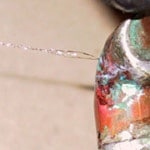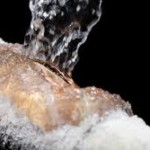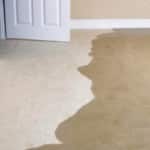Plumbing leaks are one of the most common plumbing problems. The problem with plumbing leaks is that they can cause a lot of damage to the surrounding area and they are a huge source of water waste. When it comes to plumbing leaks, identifying the leak and making repairs quickly is super important to prevent further damage and waste. Here are some of the most common types of plumbing leaks, their causes, solutions, and how to prevent them.

Pinhole leaks are a common plumbing leaks that occurs for a variety of reasons; corrosion, or damage from a nail or screw to name a few. Pinhole leaks are bad because they usually go without discovery for a while due to the fact that they are a small and slowly leak water. Once a pinhole leak is discovered, it is important to make repairs right away. You should also access the surrounding area for any water damage or mold. The longer the leak goes undetected the more chances of damage to the surrounding area. To prevent pinhole leaks, consider installing a water filtration system to remove sediment that causes corrosion. In addition, before making any household repairs try and locate your plumbing pipes before nailing or screwing anything into the wall, and if you do end up piercing a pipe, don’t pull the nail out. This can cause water to leak more rapidly. Contact your plumber right away.

When a pipe bursts there is going to be a large amount of water gushing or flooding the area. That is why this type of leak is considered a gusher water supply leak. These plumbing leaks present themselves front and center and command your attention right away. Freezing temperatures and pipes that are not insulated can be a cause of a burst pipe. When a burst pipe occurs, turn of the main water supply to prevent further damage, water waste, and prevent a dangerous situation where what meets electricity. Then you should call your emergency plumber right away. To prevent burst pipes, make sure your plumbing is properly insulated if you live in an area that is prone to freezing temperatures. Even locations that rarely get below freezing should have insulation, in the event of a weather fluke they are most venerable to frozen pipes.

A slab leak can be a sneaky leak that goes undetected for a while. Slab leaks occur with the plumbing pipes that are buried beneath the concrete foundation of your home. This can occur from the ground settling or an earthquake. It can also occur from too much water pressure or damage from liquid drain cleaners. One of the first symptoms of a slab leak is an unexplained hike in your water bill. You may also have noticed unexplained puddles of water on the floor. If you suspect you have a slab leak, contact your plumber right away for further diagnosis. There are many new non-invasive ways to repair slab leaks. To prevent slab leaks make sure your water pressure is appropriate. The residential guideline for PSI is no more than 80. In fact, many household appliances will fail if the PSI is too high. In addition, avoid using harmful chemical drain cleaners. Liquid drain cleaners won’t take care of a serious blockage, and only put a bad aide on a plumbing problem. Not to mention they can damage your plumbing and contaminate the environment.
Do you have a leak that needs attention? Contact John Owens Services today! Our leak detection specialists are the best at detecting, identifying, and repairing leaks. We use state of the art technology to quickly locate the leak to prevent damage and waste. Learn more here!
Our philosophy is simple, we always want to maintain equipment to give it the longest life possible. Next, we want to focus on repairing when something goes wrong. Then only as the last choice, we replace equipment when needed. That’s the John Owens Way.